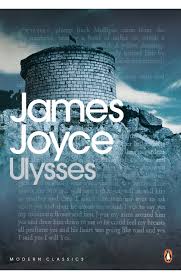Ulysses
by James Joyce
1922
“Every life is in many days, day after day. We walk through ourselves, meeting robbers, ghosts, giants, old men, young men, wives, widows, brothers-in-love, but always meeting ourselves.”
‘Ulysses’ was a hard read, 933 pages of  complex, allusive text, full of echoes, references, challenges and puzzles. Reading this novel passively, without paying full attention, is pretty pointless, and even with three weeks of concentrated reading, most readers, myself included, working without the benefit of one of the many guides available, will probably only scratch the surface of this novel’s complexity.
complex, allusive text, full of echoes, references, challenges and puzzles. Reading this novel passively, without paying full attention, is pretty pointless, and even with three weeks of concentrated reading, most readers, myself included, working without the benefit of one of the many guides available, will probably only scratch the surface of this novel’s complexity.
The novel’s reputation as being unreadable, on the other hand, is unjustified. A parallel with Shakespeare’s prose might help – Shakespeare is often described as being hard to follow, but if you take care and pay attention there is little in the canon that can’t be understood by a native speaker. ‘Ulysses’ is the same. (Incidentally, Shakespeare, and specifically Hamlet, echoes repeatedly throughout the novel)
Take Molly Bloom’s stream of consciousness chapter at the end of the novel. Joyce attempts to capture Molly’s thoughts as she drifts back off to sleep after being woken by Leopold, returning worse for wear from his adventures. Her thoughts range widely from her childhood memories to the events of the day. We all know that as we fall asleep our thoughts become incoherent and even bizarre. But the thread of Molly’s thoughts can almost always be followed, if one takes the time to do so.
“and Gibraltar as a girl where I was a Flower of the mountain yes when I put the rose in my hair like the Andalusian girls used or shall I wear a red yes and how he kissed me under the Moorish wall and I thought well as well him as another and then I asked him with my eyes to ask again yes and then he asked me would I yes to say yes my mountain flower and first I put my arms around him yes and drew him down to me so he could feel my breasts all perfume yes and his heart was going like mad and yes I said yes I will Yes.”
Remove some of the conjunctions, add in a full stop or two, and this is a simple memory of her first kiss and more. It is a lovely memory to close the novel, life affirming and positive.
I first read ‘Ulysses’ several decades ago, and had inevitably forgotten large chunks of it – although I was surprised at how much still remained familiar, most strikingly the chapter Nausicaa. Here Leopold watches poor lame Gerty MacDowell, on the rocks and on the shelf. This is a wonderful, tender portrait of a delusional young woman, affecting to feel superior to her friends, but sadly unable to wish away of her lameness, which is likely to make it difficult for her to marry and have children. Equally I little realised how much Stephen Dedalus’s thoughts on Shakespeare in chapter 9, Scylla and Charybdis had influenced much of my own thoughts (not really mine, Stephen’s/Joyce’s) on the subject.
Other chapters are less accessible. Chapter 12, Cyclops, includes streams of legal jargon, biblical passages, and elements of Irish mythology, and Chapter 14, Oxen of the Sun, is bravura attempt to capture the entire history of the English language, from latinate prose to Anglo-Saxon alliteration. It ends in a long paragraphs gibberish, which I will be kind and avoid quoting. I think Joyce is predicting the decline of the language into a yahooish form of slang, but I could be missing the point?
The character of Leopold Bloom is at the heart of the novel. He doesn’t appear until chapter 4, and often slips out of view, but is a likeable, easy going chap. His wife is being unfaithful to him, but he doesn’t seem to mind very much. His thoughts touchingly often wander back to the death of his baby son Rudy. He is subjected to anti-semitic abuse, but doesn’t let it get him down, and pursues his narrow life and interests with an amiable persistence. The drawer of memories and effects that he reflects on at the end of the novel is a little pathetic, but Poldy is an everyman who bounces back and survives, a humanist but puts up with being christened three times, a pacifist prepared to stick up for himself, and a bit of a dirty old man. He makes the novel ultimately worthwhile.




No comments:
Post a Comment